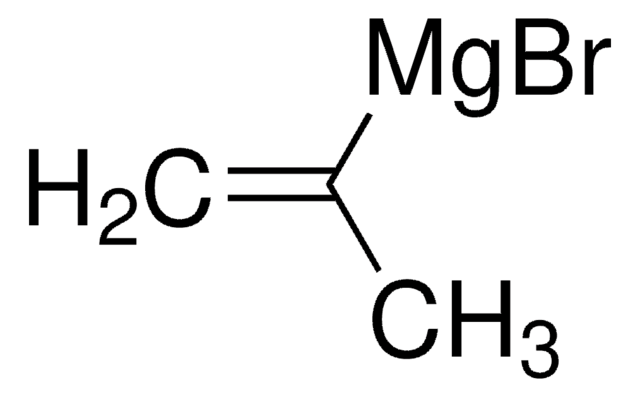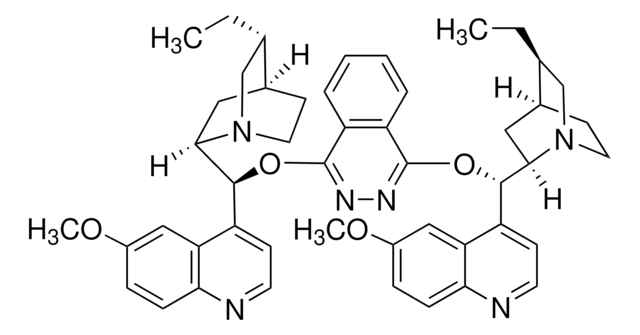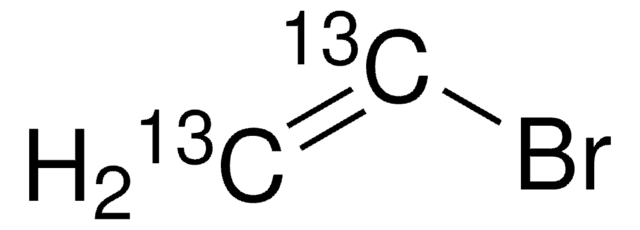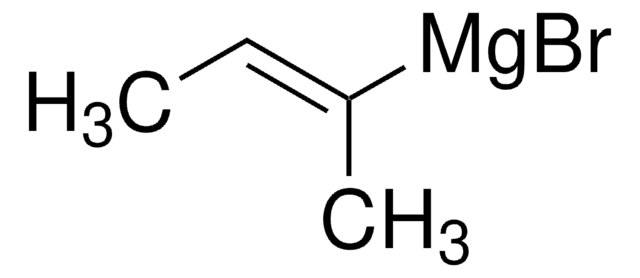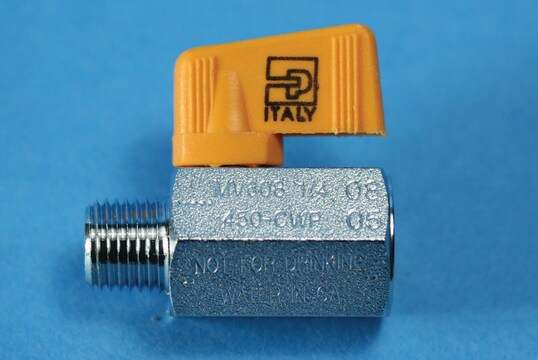225584
Vinylmagnesium bromide solution
1.0 M in THF
Synonym(s):
Bromoethenylmagnesium, Bromovinylmagnesium
About This Item
Recommended Products
Quality Level
reaction suitability
reaction type: Grignard Reaction
concentration
1.0 M in THF
density
0.981 g/mL at 25 °C
SMILES string
Br[Mg]C=C
InChI
1S/C2H3.BrH.Mg/c1-2;;/h1H,2H2;1H;/q;;+1/p-1
InChI key
XHHHAXOHMKAOSL-UHFFFAOYSA-M
Looking for similar products? Visit Product Comparison Guide
Application
It may also be used in the following transformations:
- (S)-3-(benzyloxy)-4-oxo-butanoic acid methyl ester to methyl (3S,4S)-4-hydroxy-3-(phenylmethoxy)hex-5-enoate.
- (R)-1-Azido-5,6-epoxyhexane to (S)-1-(4-azidobutyl)-2-propen-1-ol.
- 2,3-O-Isopropylidene-D-ribose to 1-[(4R,5S)-5-((1S)-1-hydroxyallyl)-2,2-dimethyl[1,3]dioxolan-4-yl]ethane-1,2-diol.
- (4S,5S)-2,2-Dimethyl-5-vinyl[1,3]dioxolane-4-carbaldehyde to (1R,4R,5S)- and (1S,4R,5S)-1-(2,2-dimethyl-5-vinyl[1,3]dioxolan-4-yl)prop-2-en-1-ol.
- Ethyl levulinate to ?-methyl-?-vinylbutyrolactone.
Packaging
Other Notes
Signal Word
Danger
Hazard Statements
Precautionary Statements
Hazard Classifications
Acute Tox. 4 Oral - Carc. 2 - Eye Dam. 1 - Flam. Liq. 2 - Skin Corr. 1A - STOT SE 3 - Water-react 1
Target Organs
Respiratory system
Supplementary Hazards
Storage Class Code
4.3 - Hazardous materials which set free flammable gases upon contact with water
WGK
WGK 1
Flash Point(F)
1.4 °F
Flash Point(C)
-17.0 °C
Personal Protective Equipment
Regulatory Listings
Regulatory Listings are mainly provided for chemical products. Only limited information can be provided here for non-chemical products. No entry means none of the components are listed. It is the user’s obligation to ensure the safe and legal use of the product.
PRTR
Class I Designated Chemical Substances
FSL
Group 4: Flammable liquids
Type 1 petroleums
Hazardous rank II
Water insoluble liquid
ISHL Indicated Name
Substances Subject to be Indicated Names
ISHL Notified Names
Substances Subject to be Notified Names
JAN Code
225584-20L:
225584-8L:4548173119069
225584-18L-C:
225584-PZ:
225584-4X25ML:4548173373140
225584-18L:4548173119045
225584-18L-KL:
225584-100ML:4548173119038
225584-VAR:
225584-800ML:4548173119052
225584-BULK:
225584-4X100ML:4548173336664
Choose from one of the most recent versions:
Already Own This Product?
Find documentation for the products that you have recently purchased in the Document Library.
Customers Also Viewed
Articles
We carry a large variety of electrophiles and nucleophiles that are widely used in C–C bond-forming reactions. This group of products contains many organometallic reagents as well as commonly-used alkylating and acylating reagents.
Our team of scientists has experience in all areas of research including Life Science, Material Science, Chemical Synthesis, Chromatography, Analytical and many others.
Contact Technical Service





